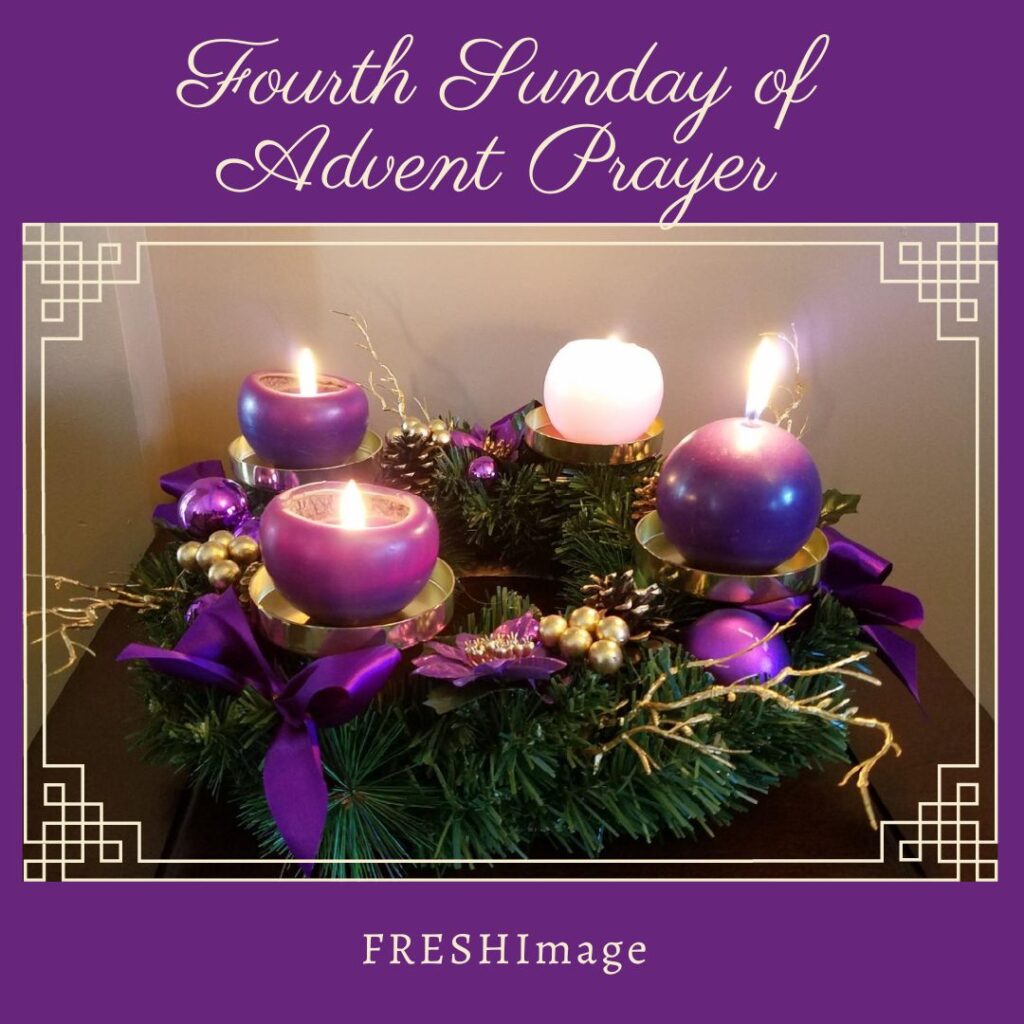
This weekend marks the fourth and final Sunday of Advent. In just a few days now, we will celebrate the birth of Jesus Christ, the Son of God. Just what His coming means for us we have reflected upon with the help of the “O Antiphons” of Advent. The reading for the lighting of the fourth and final candle of our Advent Wreath combines three of these great antiphons: “O Wisdom,” (December 17), “O Lord” (December 18), and “O Root of Jesse” (December 19). As we have seen in our reflections, the coming Messiah is Wisdom Incarnate Who is sent into the world to save it from sin and death, the Lord and Embodiment of the Divine Law Who overcomes wickedness and injustice both individually and communally, and the Root of Jesse who becomes one with the human family to draw all into His own lineage, making us members of the family of God.
We have already had occasion to reflect on what it means to live as members of the family of God just a bit. And today, we might dwell on that question just a bit more. The reading from today’s Advent Wreath Prayer from Isaiah begins: “A shoot shall sprout from the stump of Jesse, and from his roots a bud shall blossom” (Isaiah 11: 1). The naming of Jesse is a reference to King David, as Jesse was the name of his father (1 Samuel 17:12; cf. Matthew 1:6). So, the point being made here is that the coming Messiah will be a king like David His father. But this kingdom, as Our Lord tells Pilate, while having temporal ramifications, is not a kingdom like to that of worldly kingdoms (John 18:36). The question naturally arises, then what is the Kingdom of God?
In the first volume of his Jesus of Nazareth series, drawing from the Tradition, Joseph Ratzinger writes that, in a basic sense, the Kingdom is nothing less than Jesus Himself.
Through Jesus’ presence and action, God has here and now entered actively into history in a wholly new way. The reason why now is the fullness of time (Mark 1:15), why now is in a unique sense the time of conversion and repentance, as well as the time of joy, is that in Jesus it is God who draws near to us. In Jesus, God is now the one who acts and who rules as Lord—rules in a divine way, without worldly power, rules through the love that reaches “to the end” (John 13:1), to the cross (Jesus of Nazareth: From the Baptism in the Jordan to the Transfiguration, 60-61).
To rule in a divine way, Ratzinger says, is to rule “to the end,” to the point of giving oneself completely out of love on the Cross. Accordingly, this love that rules “to the end” becomes the full expression of the Law of the Kingdom of God. To live under the reign of this Kingdom means to love as God loves. This is precisely why St. John exhorts us in the following way: “Beloved, let us love one another, because love is of God; everyone who loves is begotten by God and knows God. Whoever is without love does not know God, for God is love” (1 John 4:7-8). Suddenly, this Kingdom begins to sound akin to a family, and so it is. The Kingdom of God is likewise the Family of God. Indeed, through His Incarnation, Passion and Resurrection, Christ becomes “the firstborn among many brethren” (Romans 8:29), and He makes us all brothers and sisters of our Heavenly Father through the sending of His Holy Spirit into our hearts:
For those who are led by the Spirit of God are children of God. For you did not receive a spirit of slavery to fall back into fear, but you received a spirit of adoption, through which we cry, “Abba, Father!” (Romans 8:14-15).
Those who live in this Kingdom, as members of this family, St. Paul writes, are “led by the Spirit of God.” What does it mean to be led by the Holy Spirit? It means to live as Christ lives. Yet, in seeing the love Jesus Is and Lives, we cannot help but realize, as Hans Urs von Balthasar writes, that we are incapable of loving as we ought (see Love Alone Is Credible, 61). Thanks be to God, we are not expected to live this love on our own. The only way we can love as we ought is through the “love of God [that] has been poured out into our hearts through the holy Spirit that has been given to us” (Romans 5:5).
The Holy Spirit if first gifted to us at Baptism. Those who pass through the saving waters of this sacrament are traditionally known as infantes, infants in the Christian life. And just as members of any family, we learn how to comport ourselves, what role we play in the family and how we fit in amongst its various personalities as we grow. As members of God’s Family we must do the same with the help of the Holy Spirit. The help of the Holy Spirit poured out into our hearts at Baptism manifests itself as the traditional gifts of the Holy Spirit. The gifts of the Holy Spirit are first and foremost characteristic of the love of the Messiah, as our passage from Isaiah reveals (Isaiah 11:2-3). Within us, as St. Thomas Aquinas tells us, the gifts function as Divine Instincts (Summa Theologica I-II, Q. 68.1), which enable us to imitate the life of God.
The life of God which we are to imitate is characterized by mercy. Accordingly, the Messiah, Who was to instill the rule of God on the earth was characterized by Isaiah as merciful (Isaiah 11:3-4). And thus, when that Messiah appeared, He called His followers to do the same, exhorting us, “Be merciful, just as your Father is merciful” (Luke 6:36), and telling them that it is precisely by their willingness to make the Father’s mercy known and present to the world by living out the works of mercy that they would be judged by, “Amen, I say to you, whatever you did for one of these least brothers of mine, you did for me” (Matthew 25:39).
To some extent, we find ourselves in a day and age where these activities are fashionable. The call to care for the economically poor is uttered by almost every political movement, whether or not they are willing to do so. Thus, it is important that we see that God’s mercy can never be separated from His Justice. The Messiah is not fooled by rhetoric, but as the embodiment of Truth will abide nothing less than the truth in any situation. Thus, Isaiah writes:
Not by appearance shall he judge, nor by hearsay shall he decide, But he shall judge the poor with justice, and decide fairly for the land’s afflicted. He shall strike the ruthless with the rod of his mouth, and with the breath of his lips he shall slay the wicked (Isaiah 11:3-4).
Not exactly the warm and fuzzy caricature of Jesus we are so used to hearing about. The day of the Lord will not be a joyful day for those who persecute the Lord’s least, no matter what excuses or lies they tell themselves or those around them (Amos 5:18ff). Neither with the Lord’s Day be joyful for those who refuse to acknowledge their own personal sin, for whoever says they are without sin are liars (1 John 1:8). Neither of these have any place in the family of God so long as they remain unconverted. It is as simple and as complicated as that. And so today, we pray for God’s grace, to persevere to the end in living as true sons and daughters of so merciful and just a Father. If we do, the day of the Lord will indeed be a great cause for rejoicing, for though until then carrying the burden of love will have been great, His arrival will mean perfect communion in the Family of God and the end of all suffering: “He will wipe every tear from their eyes, and there shall be no more death or mourning, wailing or pain, for the old order has passed away” (Revelation 21:4).
Your servant in Christ,
The following short prayer service has been put together by the team at FRESHImage for your use as a group as you light the fourth candle on your Advent Wreath on the Fourth Sunday of Advent at home with family and friends.
Downloadable versions of the following prayer service are available to registered FRESHImage members.

FRESHImage is a not for profit Catholic apostolate, aimed at providing individuals and communities with the resources to facilitate the full flourishing of the image of God in each and every single human person. When you live a FRESH life, you are a breath of God’s fresh, life-giving air to the world!